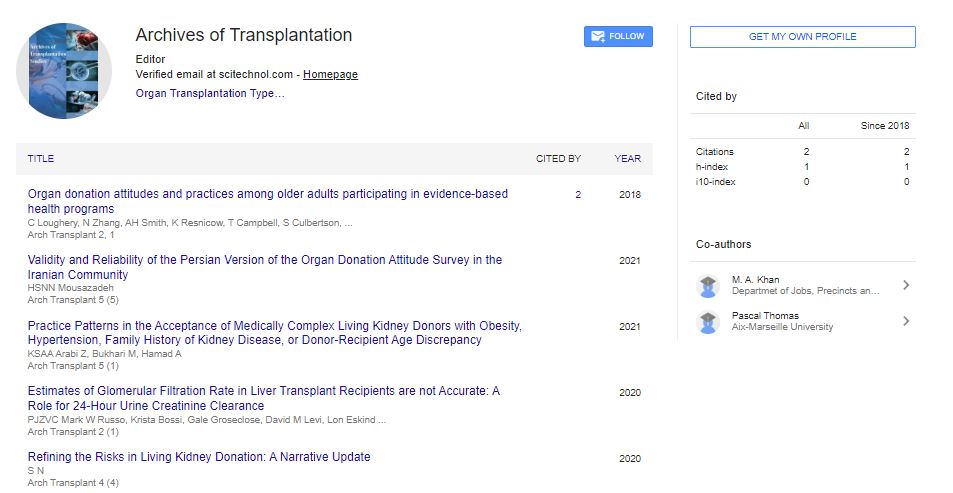Perspective, Arch Transplant Vol: 7 Issue: 4
Examining the Significance and Health Implications of Organ Donation
Karolos Andreen*
1Department of Cardiothoracic Surgery, Medical University of South Carolina, South Carolina, United States of America
*Corresponding Author: Karolos Andreen,
Department of Cardiothoracic
Surgery, Medical University of South Carolina, South Carolina, United States of
America
E-mail: karolos_andreen@musu33.edu
Received date: 22 November, 2023, Manuscript No. AT-24-124974;
Editor assigned date: 24 November, 2023, PreQC No. AT-24-124974 (PQ);
Reviewed date: 11 December, 2023, QC No. AT-24-124974;
Revised date: 19 December, 2023, Manuscript No. AT-24-124974 (R);
Published date: 26 December, 2023, DOI: 10.4172/AT.1000154
Citation: Andreen K (2023) Examining the Significance and Health Implications of Organ Donation. Arch Transplant 7:4.
Description
Organ donation is a transformative act of generosity that holds the power to save and enhance lives. This selfless act not only brings hope to recipients but also leaves a lasting impact on human health. It delves into the significance of organ donation and explore the profound health implications it has on both donors and recipients. Organ donation is, at its core, the act of life. When individuals choose to donate organs, they contribute to a chain of events that can transcend the boundaries of illness and despair. The significance lies in the opportunity to provide someone with a second chance, a renewed lease on life that might not have been possible without the generosity of a donor.
The demand for organ transplants far exceeds the available supply, developing a essential organ shortage. The significance of organ donation in addressing this shortage cannot be overstated. By willingly providing organs, donors become lifesavers, bridging the gap between life and death for those in desperate need of a transplant. This act of giving has a direct and immediate impact on reducing waiting times for recipients. For recipients, the health implications of organ donation are life-altering. Organ transplantation often means a renewed chance at a healthier and more fulfilling life.
Whether it's a heart, kidney, liver, or lungs, the transplanted organ can restore normal physiological functions, alleviate symptoms, and provide recipients with the opportunity to lead active and productive lives. The impact of organ donation on the health of recipients extends beyond mere survival. Many transplant recipients experience a significant improvement in their quality of life. Freed from the constraints of chronic illness, they can pursue their aspirations, engage in meaningful relationships, and participate in activities that were once impossible due to health limitations. Examining the health implications of organ donation also involves considering the wellbeing of donors.
While the act of donation involves a surgical procedure and a recovery period, studies show that living kidney donors, for example, generally go on to lead healthy lives with minimal long-term impact on their overall health. Knowing that their selfless act has contributed to the well-being of another person can also have positive effects on donors' mental and emotional health. The significance of organ donation extends beyond individual recipients and donors to impact the broader community's health. Successful organ transplantation contributes to the overall health of society by reducing the burden on healthcare systems, improving public awareness about the importance of organ donation, and fostering a sense of community connectedness.
Organ donation encompasses various methods, each tailored to address specific circumstances and ensure the ethical sourcing of organs. The two primary methods are deceased donation and living donation. Deceased donation involves individuals who, upon their death, have chosen to donate organs. This method relies on careful coordination between healthcare professionals, transplant teams, and donor registries to ensure timely and successful transplantation. Deceased donation often provides multiple organs, maximizing the potential to save numerous lives.
Living donation involves individuals voluntarily providing a kidney, part of their liver, or other tissues while alive. This method allows for a planned and scheduled donation process, often between family members or individuals with close relationships. Living donors undergo comprehensive medical evaluations to ensure the safety and well-being of both the donor and the recipient. While the significance of organ donation is profound, it's essential to acknowledge the challenges and ethical considerations associated with the process. Issues such as organ trafficking, equitable access to transplants, and ensuring informed consent underscore the need for continued efforts to enhance the ethical dimensions of organ donation.
Conclusion
In conclusion, organ donation is a beacon of hope that illuminates the path to improved health for both donors and recipients. The significance of this altruistic act reverberates through individuals, communities, and societies, leaving an indelible mark on the landscape of human health. As one can reflect on the profound impact of organ donation, and recognize the potential for positive change and a future where the act of life becomes a universal legacy.
 Spanish
Spanish  Chinese
Chinese  Russian
Russian  German
German  French
French  Japanese
Japanese  Portuguese
Portuguese  Hindi
Hindi 